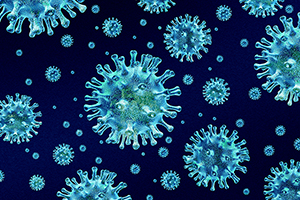I like and frequently prescribe Protocol For Life Balance . . . They adhere to the highest quality standards and at the same time they’re value-oriented, and offer some of the most competitive prices in the supplement industry. As a longtime family-owned business, they’re dedicated to their customers. In this article, learn the various ways you can protect your immune health with proper supplementation and lifestyle choices.
—Dr. Hoffman
(This article contains content provided by one of our trusted sponsors, Protocol for Life Balance. Read more about them here.)
Certain vitamins and minerals are essential for proper immune response, and therefore deficiencies in essential nutrients can negatively impact immune function. For example, vitamin A deficiency increases the severity and mortality risk of infections in general; in particular, measles and infections that lead to severe diarrhea.
Vitamin C plays a vital role in immunity. It is essential for wound healing due to its critical importance as a component of connective tissue. Vitamin C affects several other components of the human immune system, including B- and T-cell function and histamine release. It can also affect the production of other key immune cells. The effect of vitamin C supplements on the common cold is controversial; however, it is well known that vitamin C deficiency is associated with increased infections.
Vitamin D has numerous roles in the body related to immunity. These include immune modulation and regulation of cell growth. Many genes that regulate cell proliferation, differentiation, and apoptosis (‘programmed cell death’ to remove damaged cells) are partially regulated by vitamin D.
Vitamin E is involved in immune function and various cell signaling and gene expression processes, and a deficiency can impair immune response.
Chronic infections or inflammations can deplete iron, and iron-deficiency anemia can decrease immune function, leading to increased risk of infection.
Selenium has what the NIH calls “anti-oxidant” abilities to help protect against damaging free radicals. A deficiency can weaken immunity and resistance to illness by depressing immune cell counts and protecting cells from oxidative stress. Selenium metabolites can enhance immune cell activity.
Zinc is involved in wound healing and immune function. Even a mild zinc deficiency can impair immune function and wound healing, making the elderly more susceptible to pneumonia, infections and diarrhea, and skin ulcers. Zinc is associated with macrophage and neutrophil functions, natural killer (NK) cell response, and the activation of T-lymphocytes.
Stress lowers nutrient levels in the body and increases our nutrient intake requirements, providing the potential to lower immune response by creating temporary nutrient deficiencies that impact immune competence. Ideally, a well-balanced diet would provide all of the nutrients needed, but some people have biologically individual higher requirements than others, while many people are limited in their diet by cultural or religious limitations, digestive issues, distribution and economic resource problems, voluntary diets and food sensitivities such as celiac disease/gluten intolerance, food allergies, weight loss diets, and food deserts. Because of the all-too-common and well-documented limitations of nutrient intake in our population, a balance of healthy foods with supporting dietary supplementation is usually best. For those with known immune challenges, it’s almost always advised to supplement along with correcting the diet.
Much of our immune activity occurs in the digestive tract; estimates run as high as 80%, due to the large surface area of the intestines (about the size of an American football field) which is protected by immune cells. Why? Because it is necessary to “edit” the incoming material to allow only digested nutrients to pass through the cells lining the G.I. tract to circulate in the true interior of the body. Food is first processed by chewing and adding the starch-digesting enzyme amylase from saliva. Mucus lining the digestive tract contains IgA antibodies to reduce the number of microorganisms. Then the sterilizing acid bath in the stomach kills even more microorganisms as it liberates (digests) nutrients such as vitamins and minerals from their food complexes while providing a low pH to allow pepsin to start digesting (unraveling) proteins. Obviously, antacids short-circuit these mechanisms. When the semi-digested mash is sent to the intestine, pancreatic enzymes and bile salts from the gall bladder continue the digestive process.
Digestive enzymes, both plant-derived and animal-derived, can help to more completely digest food and lower the potential burden on our immune systems. However, if the layers of various desirable probiotic organisms, both yeasts and bacteria, normally lining the gut are not intact and healthy, then there is increased risk of undesirable organisms overgrowing and of the gut lining itself losing its integrity, creating immune challenges from undigested food particles and a resultant overgrowth of undesirable organisms.
Specific strains of probiotics may aid immunity while also helping to prevent the inflammatory reactions and diarrhea that may result from immune provocations. These include certain probiotic yeasts, as well as lactic acid bacteria, such as Acidophilus and certain Bifidobacteria. But such claims must be strain-specific, not generic. Probiotics are supported by prebiotic fiber, also known as resistant fiber, to act as a fermentable food source for probiotic bacteria; so fibers such as prebiotics are also considered to be immune supporting.
Immunity can be impaired by vigorous exercise, especially if inherent nutrient deficiencies inadequately support repair and immune function needs that are increased by the stresses of exercise. Functional deficiencies can also occur due to exercise. These occur when above-normal demand creates apparent deficiencies even when nutrient intake is considered normally adequate. Vigorous exercise is known to challenge the immune system; in fact, marathoners have been shown to run fevers after these competitions, and some world-class athletes take their temperature the morning after a challenging workout to assess their potential for more exercise that day. A slight fever indicates the need to take it down a notch.
Whey proteins contain weak versions of immune factors similar to what’s found in colostrum, which is also sold as a food and dietary supplement. Colostrum is the nourishing fluid produced by mammals as food for the newborn in the few days after birth, before milk production begins.
Preliminary science indicates that the ancient use of Astragalus (Astragalus membranaceus) root as an adaptogenic herb to aid in normalizing immune response has a legitimate basis. Similarly, preliminary science hints at the promise of Cat’s Claw (Uncaria tomentosa) to support the immune system’s response to challenges.
Andrographis paniculate helps to support a healthy and balanced immune response. Andrographis has been shown in non-clinical studies to support a number of aspects of healthy immune function, including the enhancement of T-Cell and Natural Killer Cell activity. This herb is used in Asia much like Echinacea is used in the West, though Andrographis actually has better evidence of efficacy; probably due to the varied types of Echinacea products on the market. Echinacea (several species; most notably E purpurea and E angustifolia) has long been used to support seasonal immunity. The great variety of products—and the fact that the strength of active compounds can vary based on part of plant used, environmental factors, and processing variations—makes it difficult to legitimately compare and combine studies in reviews and meta-analyses. But many users rely on the historic efficacy of Echinacea products, both alone and in combinations.
Black Elderberry (Sambucus nigra) is a fruit from a small tree. Elderberry provides Vitamins A and C, as well as anthocyanins, which are potent free radical scavengers, and is historically used for its role in immune system function.
Olive Leaf Extract (Olea europea) is commonly used for immune support (with a less well known benefit for heart health), but is best known for its potent oleuropein glucosides and active polyphenols, which are free radical fighters.
Mushrooms and functional fungi have a long history of use both as food and immune system-influencing substances. Most are rich in compounds known as beta-glucans (Beta-1,3/1,6 D-Glucan), which support a healthy immune system through their ability to maintain and modulate several aspects of immune function, including macrophage activity and immunoglobulin production. Beta-glucans can also come from the cell walls of certain yeast (Saccharomyces cerevisiae; commonly known as Bakers’ yeast), barley, and other grains. AHCC® (Active Hexose Correlated Compound) is a proprietary extract produced from specially cultivated and hybridized mushrooms. According to extensive research in humans, AHCC® supports healthy immune system function through its effects on specific immune cells.
Children should be well-nourished to avoid nutrient deficiencies that reduce resistance to disease. A multiple vitamin is usually sufficient, along with a balanced diet including fresh foods, plus exercise.
Protocol Immune Renew™ in veg capsules is a healthy immune system-supporting formulation with Standardized Astragalus Extract and a unique High Beta-Glucan Proprietary Mushroom Blend consisting of U.S.-grown organic mycelium biomass. Astragalus has been shown in non-clinical studies to support a number of aspects of healthy immune function. Scientific studies have demonstrated that the 1,3 form of Beta Glucan found in mushrooms possesses remarkable abilities to support both innate and adaptive healthy immune function. This adaptogenic formula can be used daily throughout the year.
Protocol’s AHCC® (Active Hexose Correlated Compound) is offered in veg capsules in 500 mg potency.
Protocol A-Biotic CF™ enteric-coated softgels combine allicin from fresh garlic with Elderberry Extract, Olive Leaf Extract, and Oregano Oil – three natural compounds that have been used extensively to provide healthy immune system support.
L Glutamine, 1000mg – In terms of immune function – a growing body of evidence suggests that during certain stressful times the body may require more glutamine than it can produce. Under these conditions glutamine may be considered a “conditionally essential” amino acid. Glutamine aids rapidly growing cells (immune system lymphocytes and intestinal enterocytes).
Neil E. Levin, CCN, DANLA is the NOW Foods Senior Nutrition Education Manager







